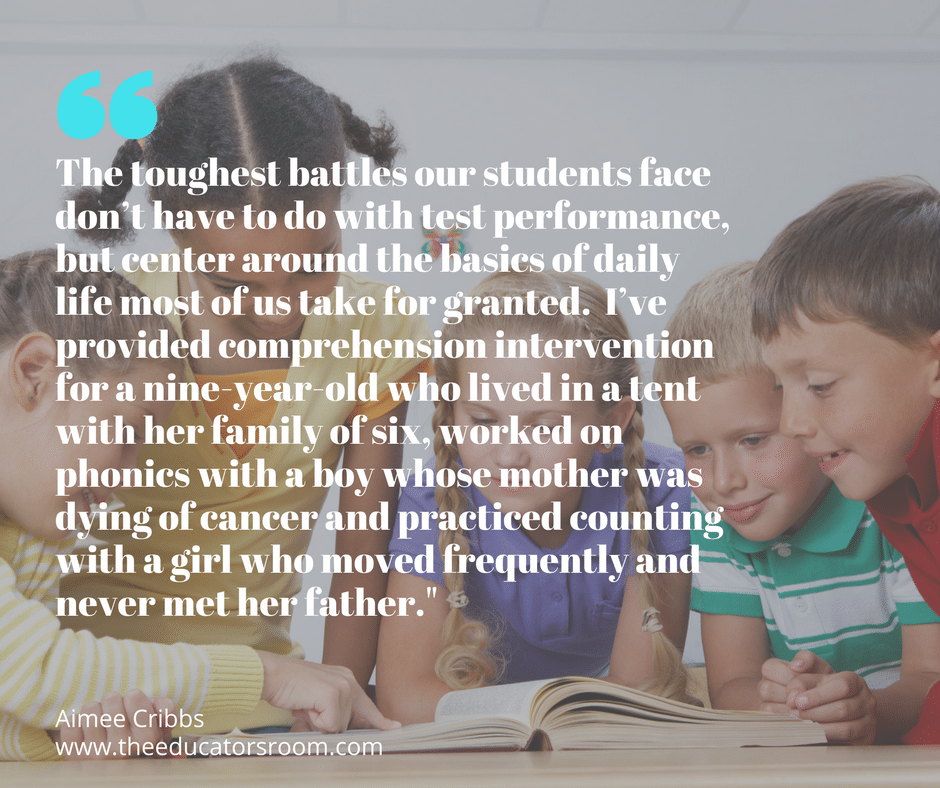A decade ago, I was the first classroom teacher at my elementary school to complete a round of RTI. The counselor, principal and I went into the process with confusion, determined to get a struggling third-grade student the help she needed. Since those early RTI days, I’ve provided tier II and III interventions and watched multiple students benefit from the process. My former school has streamlined the RTI process and serves as a model for the school system. But like many of those who responded to the Educators Room RTI survey, I have mixed emotions about the practice.
Done properly, RTI makes a difference in the academic achievement of struggling students. The process leads to individualized, intensive intervention and limits over-identification of special education students, as it was designed to do. But after a decade of providing RTI services, I’m left wondering if the cost is greater than the benefit. I also worry that targeting academic achievement just isn’t enough, especially when it comes to elementary learners who are setting the stage for their educational career.
A hallmark of the system is that it leaves room for local interpretation. As TER survey results indicate, students qualify differently and are assessed differently within the process. Most educators may not realize that RTI itself is not a federal mandate. Per IDEA 2004, districts are open to use any type of research-based system for evaluation and identification of learning disabilities. (IDEA, 204, 614 [6] B). As each school, even within the same district, is unique, this individualization piece is significant. At that same time, it can complicate an already challenging process. How many data points do we actually need? How do we assess progress? How long is too long to remain in the system? And what’s up with the graphing?
In practice, RTI amounts to an enormous amount of assessment and paperwork for educators and students who are already drowning in a testing culture. Many of our readers expressed concern about the lack of time and people available to carry out the RTI process. I’ve felt the mental and physical exhaustion first hand that comes from constant assessment and meetings during planning time. The process is doable when those who struggle are in the minority. But what about those of us who serve Title I populations, where more students need intervention than do not? When administrators and educators are stretched to their absolute limit, does it have an impact on the school culture that outweighs the benefits of data-driven instruction? In my experience, yes.
And then there’s the question of achievement. Students who are significantly behind their peers certainly need and deserve something beyond the norm, but I worry that the norm has become so test-centered that we often miss what our students really need. Three mornings a week for the entire 2016-17 school year, I did an intensive phonics intervention with fourth-grade students who tested below grade level. The group made gains. Their graphs looked great, but I’d argue that their most significant progress didn’t make it to the documentation. Neither did their struggles.
While every student in the RTI system can benefit from targeted skills intervention, most struggles are a symptom of a much larger problem. The toughest battles our students face don’t have to do with test performance, but center around the basics of daily life most of us take for granted. I’ve provided comprehension intervention for a nine-year-old who lived in a tent with her family of six, worked on phonics with a boy whose mother was dying of cancer and practiced counting with a girl who moved frequently and never met her father. Even in the least desperate cases, with the most loving families, most just don’t know how to “do school”. On the rare occasion that students read at home, it’s with parents who also struggle to read. Kids who lack number sense stay up to all hours of the night playing video games and come to school exhausted.
[bctt tweet=”Even in the least desperate cases, with the most loving families, most just don’t know how to “do school”” username=””]
So, within the culture of poverty, our students’ triumphs are small (but very meaningful). Sure, I was proud to see a fourth-grade girl improve her reading skills over the course of the year. But I was more proud that she stopped having fights on the bus, showed up to school more often, and expressed pride in her ability to make it through an entire grade-level passage without giving up. There is just so much of the picture that weekly progress monitoring misses. So much of what we do as interventionists, especially in the elementary grades, has to do with making students feel important and safe.
Yes, interventions need to be skill-based and specific. But they need to be people-specific, too. As long as we keep students and educators as the focus of the RTI process, data will improve on its own.






